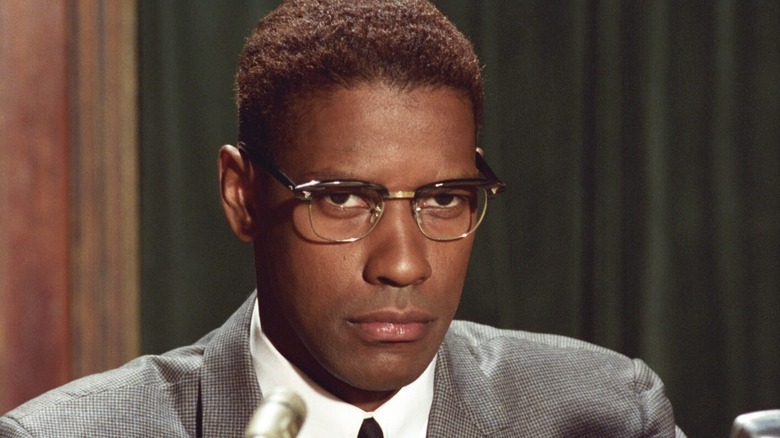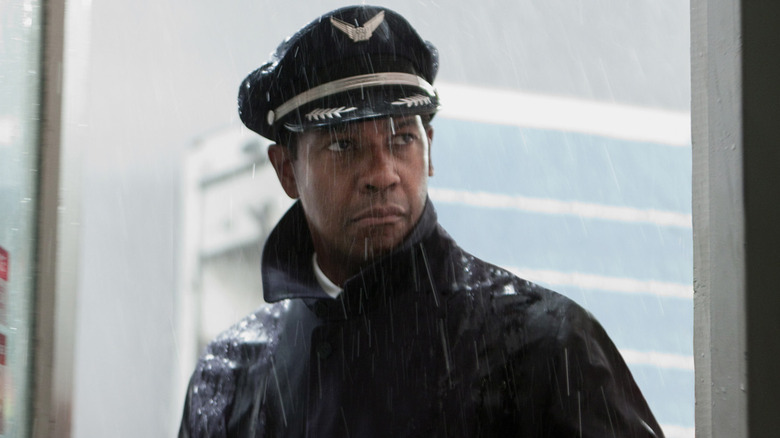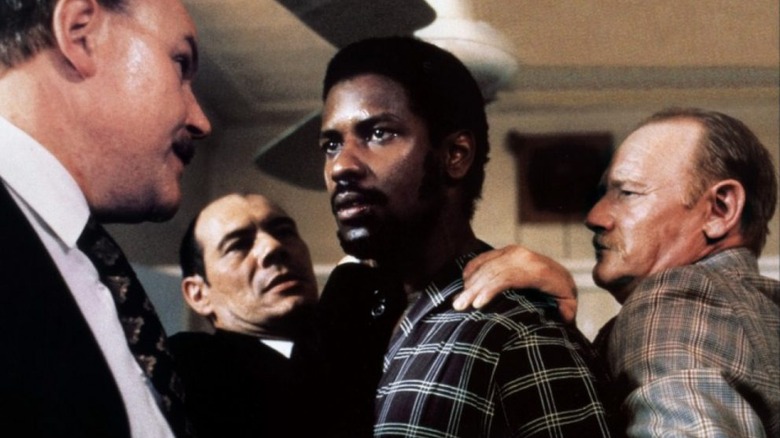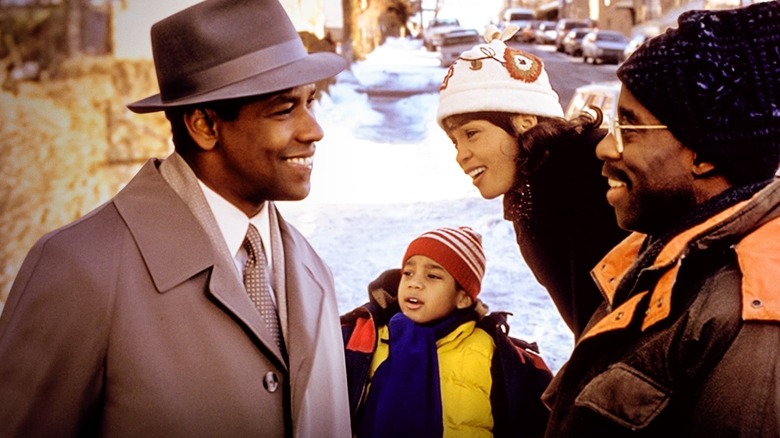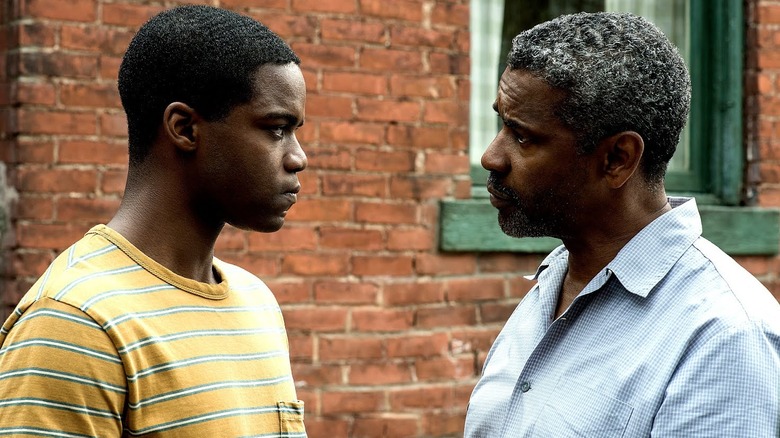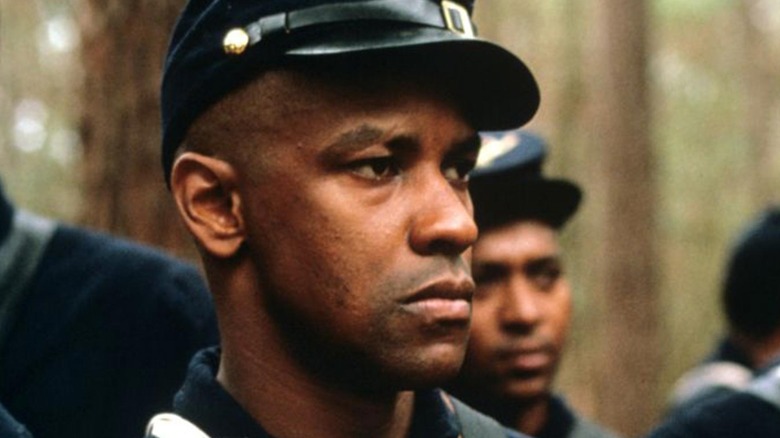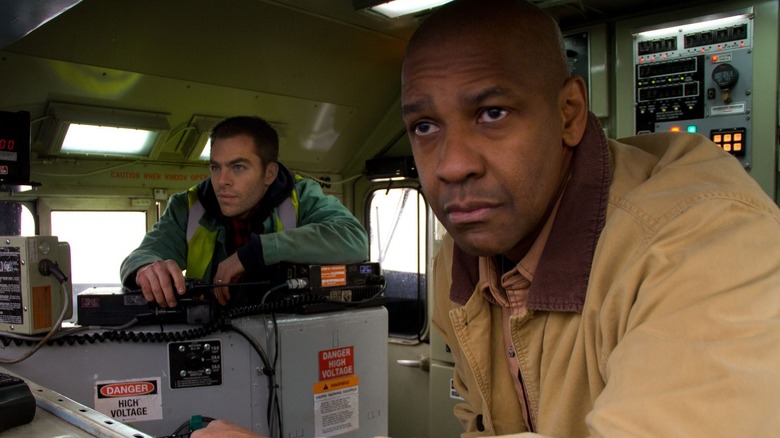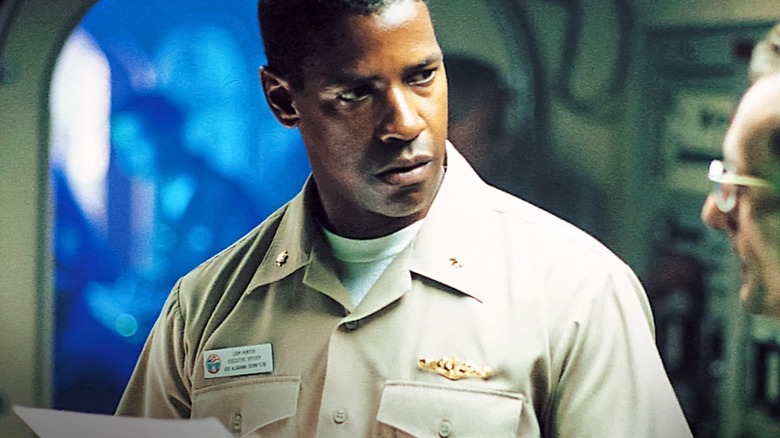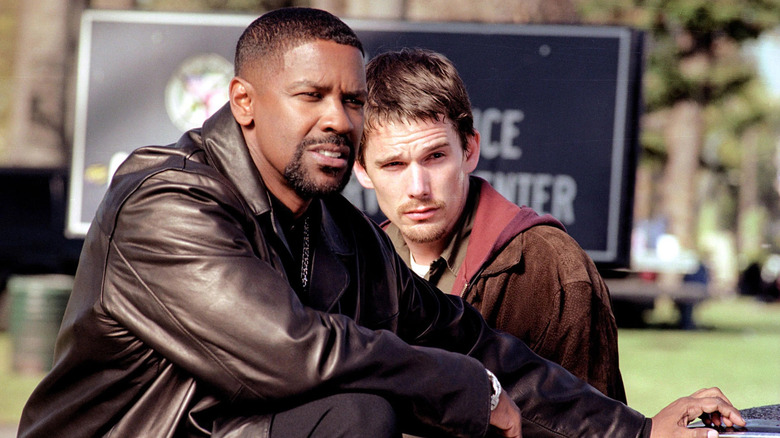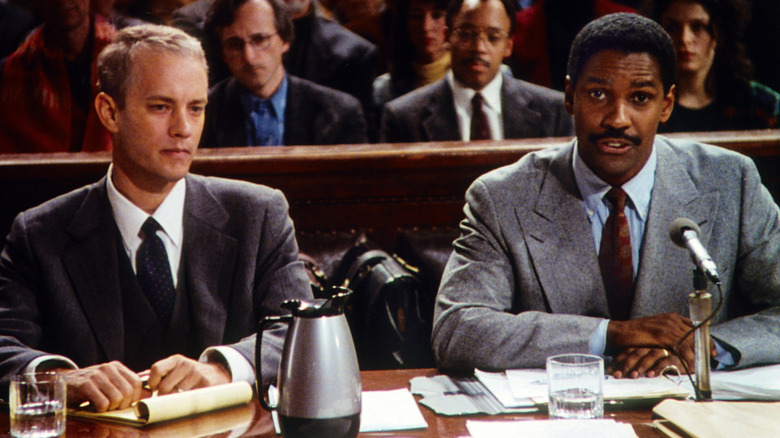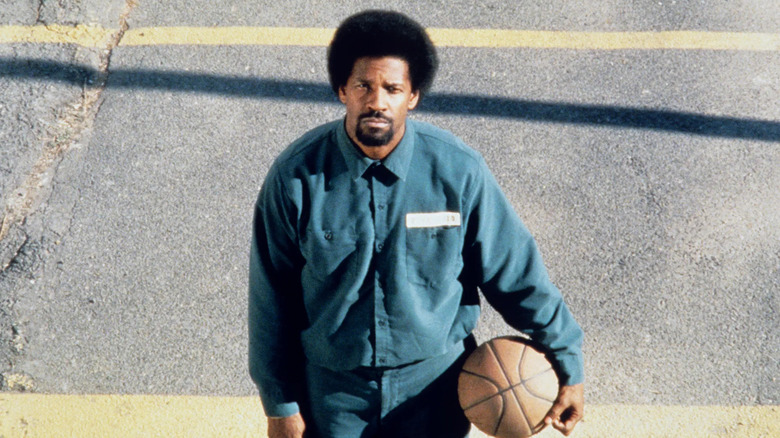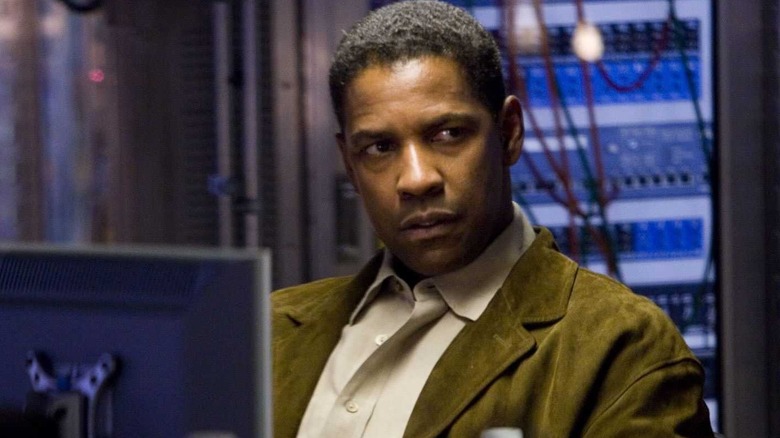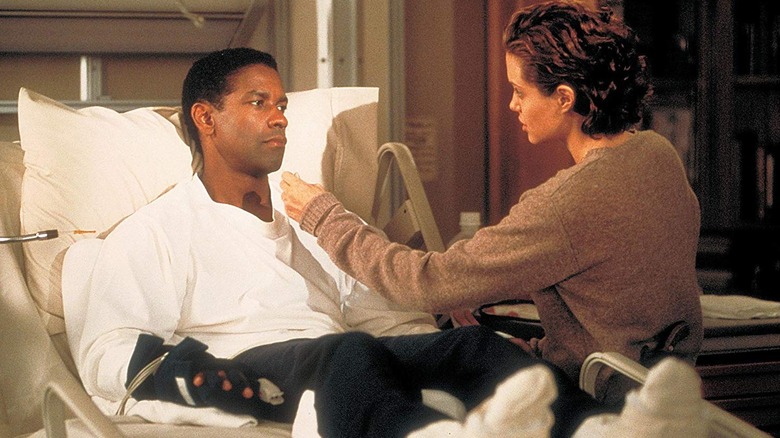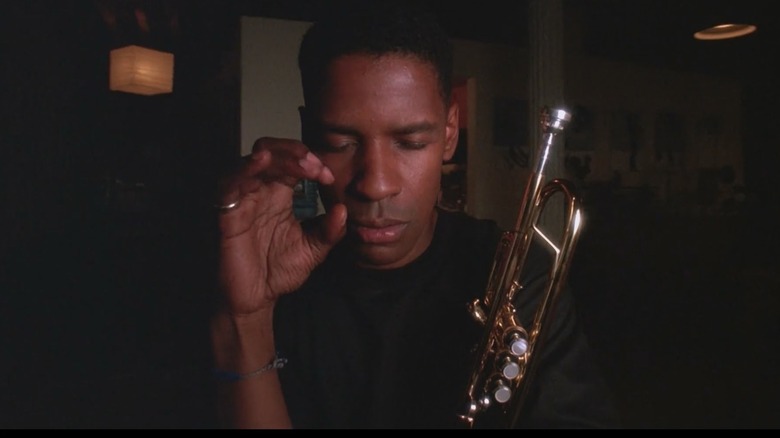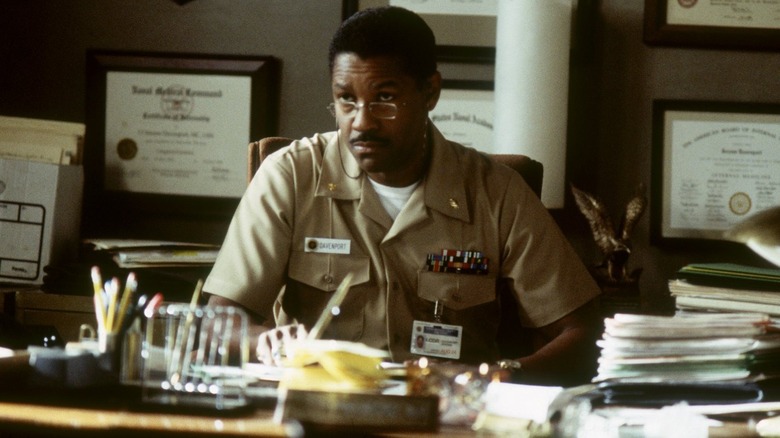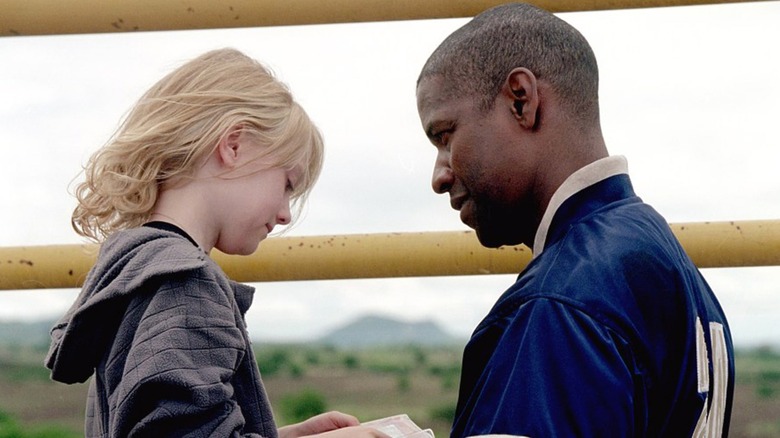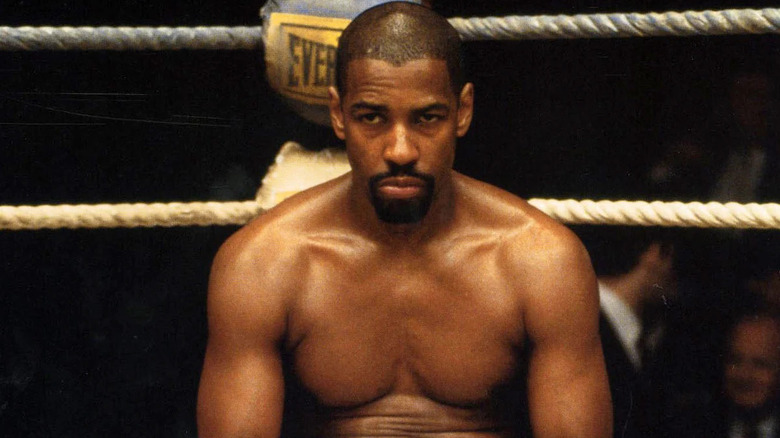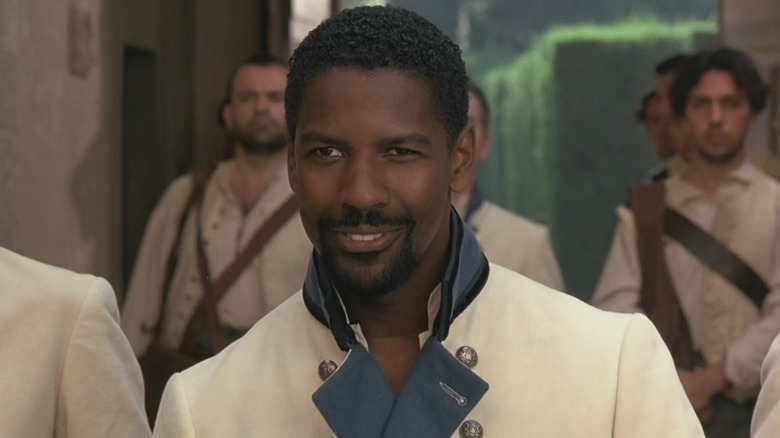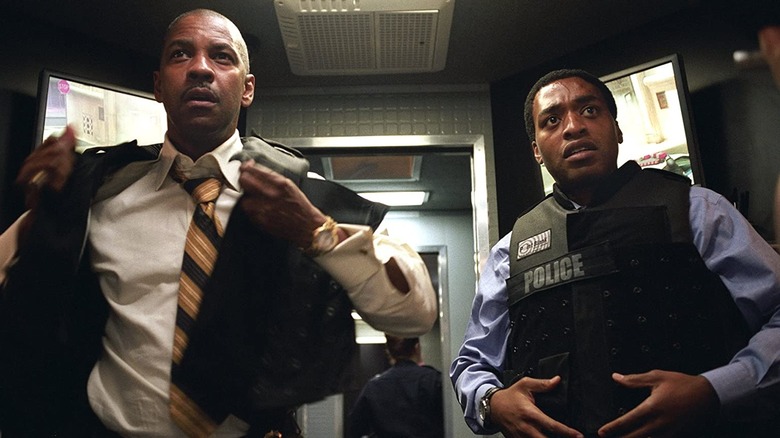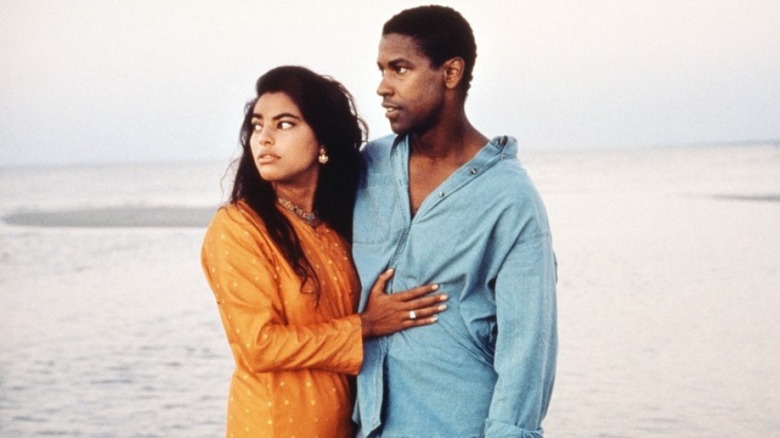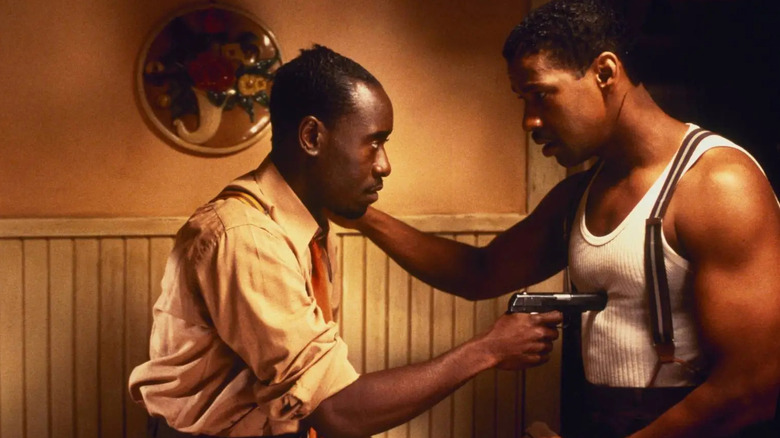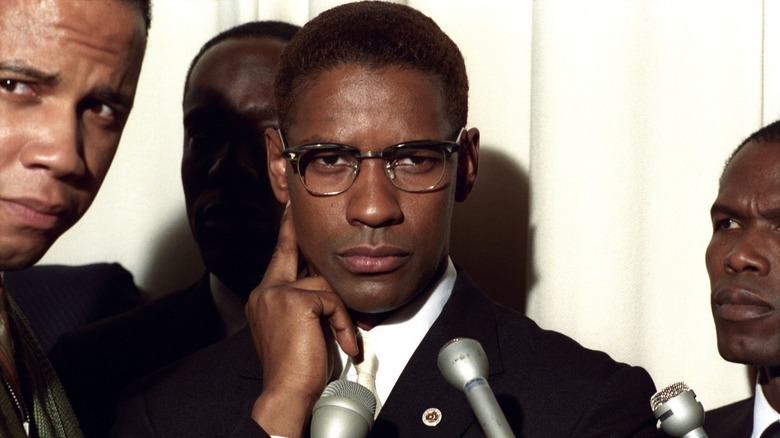The 21 Best Denzel Washington Movies, Ranked
Denzel Washington has a reputation as one of the best American actors of all time, and it's easy to understand why. First, there's the nine Oscar nominations for acting including two wins, but even if he hadn't been lauded so, his career speaks for itself. It began in earnest in the mid-1980s, when he started to make the transition from television drama "St. Elsewhere" to movies. Theater has also always been a presence for Washington, a Tony Award winner, especially the work of August Wilson.
Washington has certain directors who he has collaborated with many times, most famously Spike Lee. There's also Tony Scott, Antoine Fuqua, Edward Zwick, Jonathan Demme, and Carl Franklin. Since 2000, he has mainly made thrillers and played heroic characters, but ironically he won the Best Actor Oscar for one of his rare villainous roles. Washington always brings a magnetic charisma to whatever part he is playing, his charm permeates the screen, and he is a true movie star.
Like all the best actors, he is also a brilliant reactor, with his eyes and mouth speaking volumes. Whether it's a clenched jaw or a wide smile, Washington uses his face and body expressively and with purpose. He is likewise skillful with dialogue, a master at delivering great and memorable monologues. One of the best to ever do it, let us take you on a tour of Denzel Washington's best movies.
21. Flight (2012)
Robert Zemeckis has had an eclectic career, to say the least, and after spending the 2000s making three motion-capture animated features, he returned to the adult drama with "Flight." Denzel Washington plays an alcoholic pilot named Whip, and the movie opens with an astonishing plane malfunction causing a nosedive which Whip helps control by inverting the plane. He manages to land the plane in a field, with only six lives lost.
The movie never really matches up to the thrilling opening again (dropping this to the bottom spot), but Washington is ably supported by Kelly Reilly, Bruce Greenwood, and John Goodman, and is reunited with Don Cheadle after "Devil in a Blue Dress." The film's main tension is between the fact that Whip did manage to heroically save nearly 100 lives, but was intoxicated while doing so. After the crash, Whip continues drinking and becomes involved with a heroin addict who's attempting to stay clean. Despite Whip's lawyers' best efforts, he gets drunk right before a crucial hearing regarding the incident and has to be revived by his dealer (Goodman) bringing him cocaine.
Washington is impressive as ever in his central role, and he plays the dichotomies of his character well. He is clearly self-destructive but tries to limit how many people he drags down with him. While the ending is somewhat treacly, Washington carries us through on the strength of his performance, and the opening crash has to be seen to be believed.
20. Cry Freedom (1987)
1987 marked Denzel Washington's first major transition into being a critically-acclaimed movie actor. Directed by Richard Attenborough, "Cry Freedom" earned Washington his first Oscar nomination, and at the time he was best known for the medical television series "St. Elsewhere." "Cry Freedom" is based on the true story of anti-apartheid activist Steve Biko, who was beaten to death in prison. Washington only appears in the first half of the film, with the second half focusing on newspaper editor Donald Woods (Kevin Kline) and his efforts to escape South Africa with his book manuscript about Biko.
An early example of Washington bringing his alluring appeal (aided by his natural gap-toothed smile) to a role, and it's easy to see him as someone who could command crowds. One of the highlights is an interrogation scene with Timothy West's security officer Captain De Wet, in which Washington's Biko remains defiant, and later his 'trial' in which he delivers an eloquent and persuasive speech. Although the film slips into white savior territory, especially with the focus on Woods in the second half, it also features Biko challenging and interrogating white liberalism.
Working with Attenborough, Sidney Lumet, and Edward Zwick early in his movie career established Washington as a prestige player and force to be reckoned with, as born out in the accolades and plaudits he received at a relatively young age. He brings an energy to "Cry Freedom" that is sorely missed in the second half.
19. The Preacher's Wife (1996)
Denzel Washington has not appeared in many movies that could be considered light, comedic, or for a family audience. "The Preacher's Wife" directed by Penny Marshall ("Big," "A League of Their Own") is a remake of the 1947 Cary Grant movie called "The Bishop's Wife." It may have been expected that Washington would take the serious, cantankerous role of the preacher (played by Courtney B. Vance), but instead, he plays against-type as the angel Dudley. Whitney Houston takes the titular role of the preacher's wife.
Washington exudes charm and charisma no matter what role he is playing, but he rarely gets to use this in a comedy. His characters are usually married, so while he does occasionally get to be romantic, he doesn't often do rom-coms. In "The Preacher's Wife," he is sent to Reverend Biggs to help him save his church and his marriage. However, there is a slightly odd tone in that he kind of romantically woos Julia (Houston). They go dancing and ice-skating together, and there's a brief shot towards the end where he imagines that he's married to her.
"The Preacher's Wife" could easily be a nostalgic Christmas favorite, if you watched it during a susceptible time during your childhood. Justin Pierre Edmund is great as the Biggs' son Jeremiah who has a best friend, Hakim, that they're trying to save from going into foster care. This movie, while not remarkable enough to make it higher on the list, is an interesting anomaly in Washington's career and it's fascinating to see him play a character so different from his other roles.
18. Fences (2016)
Denzel Washington got his start in the theater, and his love for it has remained throughout his career. He has a long-standing relationship with the playwright August Wilson (watch the Netflix documentary "Giving Voice" for more) and appeared in "Fences" on stage before deciding to adapt the play for film. Washington has only directed four feature films, and he clearly only takes on that role when it's a true passion project.
Supporting Washington and Viola Davis in their main roles as Troy and Rose Maxson are Stephen McKinley Henderson (another Wilson regular) as Troy's best friend Bono, Russell Hornsby as Troy's older son, Lyons, and Mykelti Williamson as Troy's brother Gabriel. Gabriel has a learning impairment after sustaining a head injury during World War II. The film's theatrical origins are evident in the long, dialogue-heavy scenes which mostly take place in the Maxson home, but this does not diminish the power of the performances. It will have you wishing to have experienced them on the stage, though.
Washington's skill at working with actors as a director should not be underestimated. He often has younger costars who are learning from him as a scene partner and sometimes as a director, too. Washington translates the blocking of the play to the screen well, and this translation is not always easy. "Fences" is rightly lauded for its performances and is another impressive achievement for Washington. The fact that this award-winning film is further down in the rankings of Washington's best movies is a testament to how many excellent roles the actor and filmmaker has under his belt.
17. Glory (1989)
Denzel Washington's first Oscar win was for a fairly small role in Edward Zwick's account of one of the first regiments of Black soldiers to form during the Civil War. "Glory" stars Matthew Broderick as the colonel who leads the regiment, Cary Elwes as his second-in-command (who he sometimes clashes with), and Morgan Freeman and Andre Braugher as members of the company.
Washington's Silas Trip is an obstinate, proud, stubborn, and rebellious former slave, who has altercations with his fellow soldiers and superiors. He appears to desert and is caught and flogged on a back that is already riddled with scars. Freeman's John Rawlins explains to Shaw (Broderick) that Trip had been trying to find shoes because all of the men's shoes are falling apart. When the men realize they are being paid less than white soldiers, Trip leads a rebellion where the men tear up their vouchers and refuse to be paid at all.
Washington's best moment comes when the men gather around fires to deliver pre-battle hymns, prayers, and speeches. Trip finally admits, "Y'all's the onliest family I got," and that he loves the men of his company. While this does have some of the same issues as "Cry Freedom," where the top-billed actor is white, more time and attention is given to the Black characters here. One of the best through-lines of the film isn't focused on Washington's character, but is an examination of the change from Shaw's childhood friendship with Braugher's Thomas Searles to being his commanding officer.
16. Unstoppable (2010)
Tony Scott's final movie before he died was an action-packed juggernaut that provides relentless tension from start to finish. Astonishingly, "Unstoppable" is based on a true story, and like the bus in "Speed," features a train that cannot be stopped, even though it's hurtling full-throttle into populated areas. Instead of a bomb as its cargo, it has a payload of toxic chemicals. Denzel Washington is once again paired with a younger actor; in this case, Chris Pine. Washington's Frank is a veteran looking at early retirement, and Pine's Will is a rookie looking to learn on his first days on the job.
After several different plans to stop the runaway train fail, Frank and Will take it upon themselves to try to couple their train to the speeding one in order to slow it down. When this doesn't work, Will must try to make his way to the front of the unmanned train in order to apply the brakes. One of the main dangers is the presence of any curves on the tracks, which are points when it's easy for a high-speed train to derail, as can be seen in the Stanton Curve section.
While both Frank and Will are each given suitably tragic backstories so we care about them, "Unstoppable" isn't a film to look to for character development. It's a high-octane thriller, which is expertly structured, littering believable obstacles at well-paced intervals. The constantly circling news helicopters add another level of pressure, on top of what is already an unbearably tense time. Still, maybe not Washington's most intense film.
15. Crimson Tide (1995)
Denzel Washington's first of many collaborations with director Tony Scott was a thriller mostly set in the tense and claustrophobic setting of a nuclear submarine. "Crimson Tide" is mainly a two-hander between Washington's Ron Hunter and his commanding officer Frank Ramsey (Gene Hackman) as they engage in a battle-of-wills during a potential missile strike. Ramsey is more trigger-happy while Hunter is more cautious, and this eventually leads to a mutiny.
"Crimson Tide" is fairly well-balanced, and Ramsey is not a total cartoon villain or war-monger, but he is rigorous about orders, protocol, and the chain of command. The sub's crew (which includes Viggo Mortensen and James Gandolfini) becomes divided, with some supporting the younger and inexperienced upstart Hunter and others remaining loyal to their old commanding officer. Washington conveys the sea of doubts boiling under Hunter's determined exterior; once he has made the radical decision to have Ramsey arrested and confined, he has to follow through.
Like most submarine films, the setting is nightmarish, and both fire and flood become significant threats during the movie's runtime. The life or death decisions that have to be made are escalated to a global level, and the immense pressure (both physical and mental) on fallible men is extraordinary. Washington often benefits from having one main counterpart to go toe-to-toe with, and it's good to see him being the younger one here. A brilliantly structured thriller that manages to time its escalations well and maintain tension throughout.
14. Training Day (2001)
Denzel Washington has worked with Antoine Fuqua four times, beginning their relationship in 2001. After playing countless real-life and fictional heroes, Washington would finally win the Best Actor Oscar for one of his rare villainous roles, in Fuqua's "Training Day." Set over a 24-hour period, the film follows Ethan Hawke as Jake, a young and ambitious LAPD narcotics officer assigned to Washington's experienced and decorated Alonzo Harris. Jake discovers that Alonzo is corrupt and Alonzo tries to coerce Jake into doing criminal things that he doesn't want to.
Washington plays Alonzo as confident, charming, bold, and brassy. He is so audacious and brazen in the things he does, you can kind of see why he has gotten away with it for this long (with some help from the higher-up corruption, too). He also tries to seduce Jake into his way of life, probing and testing his boundaries. Dr. Dre and Snoop Dogg have small supporting roles in "Training Day," and it was mostly filmed on-location in real-life South Central neighborhoods where gang activity was still prevalent at the time. The Rampart police corruption scandal of the late 1990s galvanized Fuqua and writer David Ayer to get the film into production, as the film ended up being exceedingly timely.
"Training Day" has authenticity due to its setting, and while Washington's performance is big and over-the-top, it's easy to understand why Alonzo is like this. The role is a departure for Washington, demonstrating his range.
13. Philadelphia (1993)
In one of the first mainstream Hollywood movies that tackled the AIDS crisis and featured a gay lead character, Tom Hanks received most of the attention. He plays Andrew Beckett, a lawyer who sues his firm for unfair dismissal. In the trickier and less sympathetic role of his lawyer, Denzel Washington is just as impressive, and he makes a perfect foil for Hanks. Washington's Joe Miller is initially reluctant to take on Beckett's case because it's outside of his usual expertise and due to his own homophobia.
Miller and Beckett gradually form a friendship, with Miller's wife Lisa (Lisa Summerour) and Beckett's partner Miguel (Antonio Banderas) all becoming quite close. One of the best scenes is after a party at Beckett's apartment when he and Miller are supposed to be discussing legal strategy, but Beckett becomes distracted by an aria. Jonathan Demme's direction elevates this scene into something spiritual, and Washington's reaction shots to Hanks' monologue make you realize just how incredible he is as an actor without saying anything at all.
There are the usual dramatic courtroom scenes, but they're not as compelling as seeing Miller visit Beckett in a hospital or other scenes of their friendship forming, their unexpected bond becoming stronger over the course of the film. Demme mostly avoids indulging in sentimentality, and "Philadelphia" is an important (if imperfect) film for its time.
12. He Got Game (1998)
Denzel Washington's third collaboration with Spike Lee is the story of a father and son who have a strained relationship for very understandable reasons. Washington plays Jake Shuttleworth, in prison for the manslaughter of his wife. His son Jesus is the top-ranked basketballer of his age in the country, and every single college is frantically trying to recruit him. The prison warden tells Jake that if he can get his son to sign for a particular college, he will have his sentence reduced. Jake is released for a week to try to get the deed done.
Washington is once again paired with a younger and inexperienced actor, in this case real-life basketball player Ray Allen as Jesus, and excels at being both a mentor and also someone who has badly betrayed his children. Another interesting relationship examined in the film is between Jake and Dakota (Milla Jovovich), a sex worker he meets in the seedy motel that he stays in while on release. Rosario Dawson plays Jesus' girlfriend, who struggles when Jesus visits the colleges who use anything within their means to entice him.
While the storyline is kind of ridiculous, Lee brings the usual feeling of myth-making to a movie that touches on his life-long passion for basketball. The opening montage of street basketball players looking straight into the camera is already moving before the film has even started. Lee brings nobility to everyday characters and shoots them in a way that makes them seem beautiful and heroic.
11. Deja Vu (2006)
The third of five Denzel Washington collaborations with director Tony Scott was a twisty thriller, this time with a dash of sci-fi not dissimilar to Steven Spielberg's "Minority Report." After a ferry bombing kills nearly 550 people in New Orleans, Washington's ATF Agent Doug Carlin becomes obsessed with one woman (portrayed by Paula Patton) who was killed just an hour or so before the bombing, believing she holds the key to finding the perpetrator.
Carlin is introduced to a team (played by Val Kilmer, Adam Goldberg, Elden Henson, and Erika Alexander) working on a program called Snow White which allows them to surveil events happening four days earlier. Carlin becomes convinced that he can not only identify the bomber, but also prevent the crime from happening by traveling back in time. Filming "Deja Vu" was delayed by Hurricane Katrina and it was the first movie to be filmed in the city during the months that followed.
The most interesting aspect of the movie is the voyeurism of Carlin watching Claire (Patton) in the very recent past and apparently falling in love with this ghost. There are the expected time travel paradoxes, but there is some satisfaction in seeing mysterious clues in Claire's apartment all becoming clear in the film's finale. There is also some probing of the purpose of law enforcement: is it just about punishment, or should the goal be more about prevention? Overall, the film has an engaging plot complete with a typically magnetic Washington performance.
10. The Bone Collector (1999)
Moving into his Top 10 best movies, Denzel Washington really leaned into the thriller genre in the 2000s, especially in his Tony Scott collaborations. However, during the 1990s he starred in the John Grisham adaptation "The Pelican Brief" and later "The Bone Collector," based on the first Lincoln Rhyme novel from Jeffery Deaver. Rhyme is confined to his bed after an accident during the course of his duty as a police forensics expert. He teams up with rookie cop Amelia (Angelina Jolie) to try to solve a series of clues left by a serial killer.
Washington's chemistry with Jolie is the beating heart at the center of a convoluted plot, with the scenes set in Rhyme's apartment being the best aspect. Queen Latifah shines, as always, in a small role as Rhyme's nurse. Serial killer movies such as "Eye of the Beholder," "Kiss the Girls," "Copycat," "Seven," and "Silence of the Lambs" were all the rage in the 1990s. While the plots are often silly, and stretch credulity, the commitment of the actors playing well-drawn characters makes a big difference.
Movie scenes depicting forensics experts assessing crime scenes for clues are always satisfying to watch, and scratch a similar itch to "paperwork" movies, or movies about experts conducting research and being brilliant at their jobs. The twist here is that Amelia has to be Rhyme's eyes at the crime scene and he relies on her to gather and relay information. The result is a solid, entertaining '90s crime drama.
9. Mo' Better Blues (1990)
Denzel Washington's first film with Spike Lee was about the love, life, and career complications of a jazz trumpet player. Any Spike Lee movie in which he also acts is always a treat, and usually extremely funny, and "Mo' Better Blues" is no exception. Lee plays Giant, the manager of Bleek (Washington) who is in constant trouble from gambling debts. The film also features Wesley Snipes, Giancarlo Esposito, and other Lee regulars such as Bill Nunn, Samuel L. Jackson, and John Turturro.
Bleek's two on-again-off-again girlfriends, Indigo (Joie Lee) and Clarke (Cynda Williams), help bring to life a hilarious scene where he calls them each other's names, leading to an argument shot like a tennis match, with Bleek in the middle. This being Lee, there are several fourth-wall breaks and early uses of his famous dolly shot, with Bleek spinning in his apartment while listening to a jazz track and the double-dolly in the street, with Giant trying to avoid a vengeful bookie.
The music by Bill Lee, as well as saxophonist Branford Marsalis and Terence Blanchard's trumpet playing, is a huge part of what makes "Mo' Better Blues" so good. This is probably the lightest and funniest of the Washington and Lee collaborations, as their later work features more serious subject matters. While a tragedy does befall Bleek in the cruelest manner possible, things end on a hopeful note. Like all Spike Lee films, this one is gorgeously shot and acted and is an essential watch.
8. Antwone Fisher (2002)
Denzel Washington's directorial debut came in 2002 with a movie based on the true story of a troubled naval recruit. "Antwone Fisher" stars Derek Luke in the title role in his movie debut. Fisher is sent to psychiatrist Jerome Davenport (Washington) after getting into fights. Davenport gradually gets Fisher to open up about his childhood. We learn his mother gave birth to him in jail and did not claim him after her release. He was raised in an abusive foster home, and the flashbacks are particularly hard to watch.
Davenport and Fisher come to form a close relationship. In one of the highlights of the film, Fisher is invited to Thanksgiving by Davenport's wife (played by Salli Richardson-Whitfield). It becomes clear that Davenport has a strained home life, which he is very much trying to bury, at the same time as encouraging his patients to open up. Davenport comes to realize that he has gotten too close to Fisher, and starts to back off, which has a disastrous effect.
Fisher's investigation into his past makes for a finale that elicits emotion, without dripping in sentimentality. It's interesting to see the influences on Washington's directorial style, and there are brief glimpses of Spike Lee at times, especially in the framing of his characters. The theater is always a presence with Washington, too, with his films being dialogue-heavy and lots of scenes that are two-handers — back and forth exchanges that shift dynamics. "Antwone Fisher" is an important work in Washington's overall career.
If you or someone you know may be the victim of child abuse, please contact the Childhelp National Child Abuse Hotline at 1-800-4-A-Child (1-800-422-4453) or contact their live chat services.
7. Man on Fire (2004)
Denzel Washington's second movie with Tony Scott took the duo to Mexico City for a bodyguard thriller. Washington plays an alcoholic former CIA agent named Creasy who gets a job as a bodyguard to Lupita Ramos (Dakota Fanning), and then goes on a vigilante campaign when she is kidnapped. Christopher Walken plays Creasy's former colleague and best friend Rayburn, and Marc Anthony and Radha Mitchell play Lupita's parents.
The film rises and falls on Washington's chemistry with Fanning in the earlier part of the film, so then we're fully invested and understand Creasy's violent and vengeful rampage. Luckily, both Washington and Fanning rise to this challenge. Their relationship is utterly charming, especially when he becomes her unofficial swim coach. Creasy's friendship with Rayburn is also great, as he's a loner who has pushed people away, except this one man. The cinematography of "Man on Fire" is one of its greatest strengths, with the use of hand-cranked cameras creating a disorientating whirlwind during the kidnapping scene.
While "Man on Fire" does lose some of its allure once Fanning is off-screen for a long stretch, it's still an effective thriller. With Washington at the center, there's always enough reason to remain focused. Washington's run of eight thriller movies (including the remakes of "The Taking of Pelham 123" and "The Manchurian Candidate") during the 2000s was one of his best eras.
6. The Hurricane (1999)
Denzel Washington has played several real-life figures, which have included highlighting some lesser-known men. While "The Hurricane" may have been marketed as a boxing or sports film, it is actually more of a prison drama. Washington plays Rubin Carter, who was wrongly convicted of murder in 1966 and strikes up an unlikely friendship with a teenage boy in the 1980s. Lesra Martin is living with an unconventional foster family in Canada — three friends played by Liev Shreiber, John Hannah, and Deborah Kara Unger. Martin begins corresponding with and visiting Carter, and his foster family starts a campaign to overturn Carter's wrongful conviction.
The direction by Norman Jewison and cinematography by Roger Deakins elevates "The Hurricane" beyond the standard inspirational biopic formula, as does Washington's performance. The prison-set scenes are exceptional, with Carter refusing to wear the prison uniform, eating alone in his cell, and reading and writing voraciously. The biography he writes in prison is what draws the attention of Martin. Carter gradually opening up and beginning to trust Martin and his other supporters is a rewarding journey to witness, and the campaign gaining momentum towards the end gives the second half of the film real urgency.
Vicellous Reon Shannon is impressive as the teenaged Martin, and his shared scenes with Washington are another example of him bringing out the best in his young costars. "The Hurricane" is somewhat forgotten now, but worth seeking out if you haven't seen it.
5. Much Ado About Nothing (1993)
Kenneth Branagh's "Much Ado About Nothing" is one of the most joyful, energetic, and sumptuous movies of all time, featuring a beautiful cast in one of the most gorgeous settings of any film. The opening sequence features Emma Thompson's Beatrice delivering the "Sigh No More" poem, followed by the eruption of excitement when the inhabitants of Leonato's household are informed that Don Pedro (Denzel Washington) and his soldiers are returning from war. It's absolutely exhilarating.
Washington is perfectly cast as a natural leader, who is beloved by all (except his evil brother Don John), and no one wants to disappoint. He has a lovely moment with Thompson's Beatrice — who at the time is determined to wed no man, least of all Benedick (Branagh) — where he asks her to marry him instead. He later enjoys joining in the household game of manipulating and maneuvering Benedick and Beatrice into making the transition from enemies to lovers.
Given Washington's theatrical background, it's surprising that he hasn't appeared in more movies based on plays. Not every actor can handle the text work and dialogue delivery, but Washington is certainly one of them. "Much Ado About Nothing" is a feel-good feast of a film, with a finale that's filled with singing, dancing, and white blossoms being flung into the air like confetti. "Sigh no more" indeed.
4. Inside Man (2006)
Spike Lee's fourth collaboration was a briliant heist thriller starring Clive Owen as the leader of a gang who stage an elaborate and audacious Wall Street bank robbery over a 24-hour period. Denzel Washington plays the hostage negotiator, Chiwetel Ejiofor is his partner, and Willem Dafoe plays a police captain. Christopher Plummer plays the head of the bank, who has a secret hidden in one of the vaults that he's worried the robbery might expose. Jodie Foster has one of the most interesting roles as a power broker who has her own negotiations going on in the background.
This being a Spike Lee film, the cinematography is one of the stand-out elements. "Inside Man" was filmed in a former bank on Wall Street, as well as in other real New York City locations, giving the movie an immediacy and authenticity. Most of Washington and Ejiofor's scenes take place in a surveillance van dwarfed by skyscrapers in a tunnel-like street, giving the sense that they are as trapped as the hostages. The structure of the film is also interesting, with flash-forwards to interviews with the hostages that take place after they are released.
Lee was hugely influenced by 1975's "Dog Day Afternoon" when making "Inside Man," including using two actors from Sidney Lumet's movie. The use of multiple hand-held cameras adds a feeling of chaos to the law enforcement side of things, while a Steadicam on Owen (combined with his performance) aids the sense that he is cool, calm, collected, and in total control.
3. Mississippi Masala (1991)
One of Mira Nair's first narrative features brings together an extraordinary cultural melting pot, from India via Uganda to Mississippi. It's a love story between Denzel Washington's carpet cleaner Demetrius and young Mina (Sarita Choudhury), who lives and works in a motel with her family. Roshan Seth plays Mina's father Jay, who spends the film determined to reclaim his land and home in Uganda, or at least be compensated for it.
While it does have some political and social commentary, of course, it also has a vibrant and erotic atmosphere. Mina and Demetrius' slow walk along the bayou where they share an electric first kiss, or their stroll along the beach in Biloxi before a sensual love scene are languid, lustful, and hazily dreamy. Washington's physicality — from his determined walks, to a clench of the mouth, to an adjustment of his cap — makes Demetrius a real, lived-in character.
Mina and Demetrius are a product of their family, friends, and traditions, and both want to break free and have a new life with one another. Demetrius takes Mina home for a cook-out, there's an Indian wedding, a range of dance styles are shown, and the flashbacks to Uganda provide further layers to the complex cultural context. The ending, where Jay finally returns to Uganda and realizes that it's not really home anymore, is especially moving. It's so good to see Washington in a rare romantic role, and one from a woman's perspective. "Mississippi Masala" is an absolute stand-out in his career.
2. Devil in a Blue Dress (1995)
Denzel Washington starred in one the best neo-noirs of the 1990s. Based on the novel by Walter Mosley, "Devil in a Blue Dress" is set in Los Angeles and sees Rawlins (Washington) become embroiled in a mayoral election blackmailing plot. Although Don Cheadle doesn't arrive in the movie until around an hour in, he almost steals the show as Rawlins' friend Mouse, who has his back but can be a bit too over-eager with his trigger figure. Jennifer Beals plays the titular mysterious woman in a blue dress who Rawlins is hired to find.
Rawlins is very much an everyman trying to find work so he can pay his mortgage. This sets him apart from the sardonic and cynical private detectives we're used to, such as Philip Marlowe and Sam Spade. Rawlins becomes embroiled in the case largely against his will, and tries to keep violence to a minimum. When there is collateral damage, it greatly upsets him. One of the noir tropes that writer-director Carl Franklin uses effectively here is the protagonist's narration, which Washington delivers as well as you would expect.
"Devil in a Blue Dress" has impressive production and costume design, and some breath-takingly gorgeous cars. Many have rightly lamented that we didn't get a whole series of Easy Rawlins films, as there are many books in the series. This is one of the best movies of the 1990s, and certainly deserves having more people discover it.
1. Malcolm X (1992)
While it's not the last film that Denzel Washington and Spike Lee made together, this one feels like a culmination. "Malcolm X" is Lee's epic 3 hours and 20 minutes long biopic of the complicated activist who always put his deeply-held religious beliefs before politics. It covers Malcolm's criminal career as a teenager and young man in Harlem, with Delroy Lindo as charismatic gangster Archie. Malcolm winds up in prison where he converts to the Nation of Islam. Angela Bassett plays Malcolm's wife Betty, who more than holds her own going toe-to-toe with Washington.
Some of the most astonishing moments come in the large crowd scenes. There's the hospital protest set to Terence Blanchard's stirring score, where Malcolm controls the crowd with just one finger. Another is Malcolm's pilgrimage to Mecca, where he meets Muslims of all races and starts to reevaluate some of his beliefs. Another pivotal scene is the fire-bombing of Malcolm's home, which is a great threat to his young children. Washington portrays the power of Malcolm, especially his command of rhetoric and ability to whip a crowd into a fever. But also plays his quieter notes well — his doubts, his insecurities, and feelings of betrayal after he breaks with the Nation of Islam.
This performance should have been a slam-dunk for the Best Actor Oscar, but the Academy chose to reward different roles in Washington's career. Lee brings his usual visual flourishes to this incredible story, but also often lets Washington's power command the audience's attention by itself. An extraordinary achievement.
